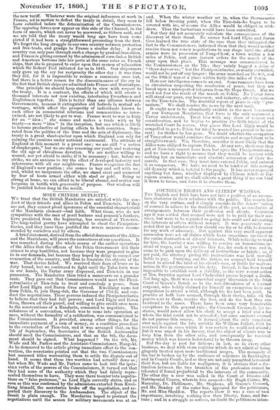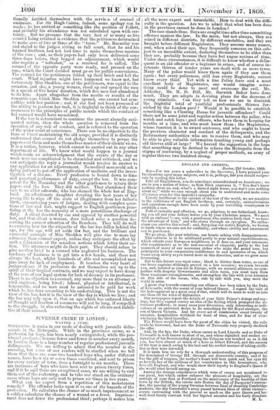COUNSEL'S RIGHTS AND CLIENTS' WRONGS. TuE English and Irish bars
have got into a position of an enema.- lous character in their relations with the public. The reason lies on the very surface, and it simply consists in the deter'-' -ration of counsel to adhere to the traditions of the past, as conclusive of arrangements between their profession and clients. Centuries ago it was settled that counsel were not to be paid for their ser- vices, hut were to be regarded as goine° into court and advocating
the interests of others without reward. It was generously con- ceded that no barrister-at-law should sue for or be able to recover the interests of others without reward. It was generously con- ceded that no barrister-at-law should sue for or be able to recover for any work of advocacy. But against this very small apparent concession were set off claims which have sometimes operated to the entire destruction of clients' interests. 'While refusing to work for hire, the barrister was willing to receive an honorarium in- stead of wages, and in practice this fee, for such it was and is, came to be paid upon the delivery of instructions or briefs ; or, if not paid, the attorney giving the instructions was held morally liable to pay. Carrying out the fiction, no counsel held himself bound to attend the trial of his client's case, or bible for =dyer- sation in the performance of his duty. Indeed, it has been found impossible to establish such a liability, as the very recent action of Mrs. Swynfen against Lord Chelmsford proves 'beyond a doubt. Not long ago, there was a somewhat angry discussion in the Irish Court of Queen's Bench as to the non-attendance of a . learned sergeant, who boldly claimed for himself an exemption freni any compulsion to attend a trial, although his fee had been paid. la practice at both bars counsel, through their clerks, take all the papers sent to them, receive the fees, and do the best they can to attend to the cases. There have been some very honourable exceptions to this general rule : Sir Cresswell Cresswell, fur in- stance, would never allow his clerk to accept a brief and a fee where the trial could not be attended ; but some eminent counsel do not pursue this course. It funned about the only complaint ever made against the late amiable Sir William Follett, that he received fees in cases which it was certain he could not attend; but it was urged in his favour, that the object of clients was to keep him from the other side, and consequently he received money which was known beforehand to be thrown away. But the day is past for fictions ; in law, as in every other business, we deal with stern realities which do not admit of being gingerly treated upon mere traditional usages. The monopoly of the bar is broken up by the audience of solicitors in Bankruptcy and in County Courts, and as they arc not only permitted to recover
their fees, but are liable for negligence, it is obvious that a dis- tinction between the two branches of the profession cannot be tolerated if found prejudicial to the interests of the community. The other day a case was called in the Court of Divorce and Matrimonial Causes, wherein five counsel—Sir Hugh Cairns, Mr. Macaulay, Dr. Phillimore, Mr. Stephens, all Queen's Counsel, and Mr. .Beasley of the outer bar, appeared for the petitioners, Mr. and Miss Shedden. The reports show it was a case or vast importance, involving nothing less than liberty, fame, and for- tune ; and in a struggle so serious, no doubt the petitioners idea-
tionally fortified themselves with the servic,ei, d. counsel Gf eminence. For Sir Hugh Ceirus, indeed, some apology can be made ; he has arrived at something like the position of Follett, and probably his attendence WM not calculated upon with cer- tainty. But we presume that the very fact of so many as five
counsel being retained is evidence, that the petitioners determined to wake eure of two er three of the "team.?' Mr. Macaulay rose and stated to the judges ,sitting in full court, that he and his learned brethren had not had time to make .themselves masters of the ease ; and, as their papers had only been delivered some three days before, they begged an adjournment, which would also require a "refresher," as a renewed fee is called. The counsel of the opposite party were ready, and pressed on the case, which the Court decided must go on for public convenience. The counsel for the petitioners folded up their briefs and left the court. What injustice might have happened we know not, but fortunately Miss Shedden, one of the petitioners, was equal to the ooestsion, and she, a young woman, stood up and opened the ease in a speech of five hours' duration, which five men had abandoned to its Me. Apart altogether from the merits or results of the romantic case which Miss Shedden opened, one cannot but sym- pathize with her position ; and, if she had, not been possessed of the ability to perform her task, it is frightful to think of the con- sequences to the principles of public morals which the conduct of her counsel would have occasioned.
If the bar is determined to continue the present absurdly anti- quated notion, then the whole question is removed from the operation of any rule of conduct, and is referred to the operation of the wider court of conscienee. There can be no objection to the Inns of Court maintaining the old usage, provided it is distinctly understood that counsel do not pledge themselves to peruse the papers sent them and make themselves master of their clients' views. It is a notion, however, which cannot be carried out in any other department of life. We know what would happen to a journal which made an acknowledgment that the events of the day or week were too complicated to be chronicled and criticized, and we can anticipate the reply a journalist would receive in answer to any application for an adjournment. No medical man could ask a dying patient to put off the application of medicine and the inves- tigation of a disease. Every profession is bound down to time and punctual performance of duty, except the bar. It was com- petent for Mr. Macaulay and the other gentlemen to return their paper, and the fees. They did neither. They abandoned their case to an abler advocate, who has shamed the whole bar of Eng- land. An affectionate daughter devoting the best years of her young life to wipe off the stain of illegitimacy from her father's birth, encountering years of fatigue, dealing with complex ques- tions of law and fact, might suggest to English gentlemen prac- tising at the bar the necessity of a more punctilious discharge of duty. A client deserted by one and opposed by another powerful bar, and that client a woman, does indeed raise a question de- serving the earnest attention of the Benchers. They will do well to examine how far the etiquette of the bar has fallen behind the age, for the age will set aside the bar, and the brilliant and successful example of Miss Shedden will give rise to more lay advocacy than counsel expect, unless they anticipate the effect by such a relaxation of the senseless notions which fetter their ac- tion. The attorneys might do their part. They should refuse to give another brief to 'a counsel who neglected his business. The tendency of business is to get into a few hands, and these not always the best, whilst hundreds of able and accomplished men pine away for lack of employment. It touches the very heart of jurisprudence if its professors do not themselves act up to the spirit of their implied contracts, and we may expect to have decay at the core of our legal system for lack of decency in its professors. There is no objection to a counsel, any more than to an attorney or civil engineer, being hired; labour, physical or intellectual, is honourable, and no man need be ashamed to be paid for work which he has done according to his undertaking. This is not the view of the bar, but it is the view of the day in which we live; and the bar may rely upon it, that an age which has enforced liberty of thought and freedom of commerce will not be long, if compelled to the struggle, in also enforcing the rights of clients and liabili- ties of their counsel.



























 Previous page
Previous page